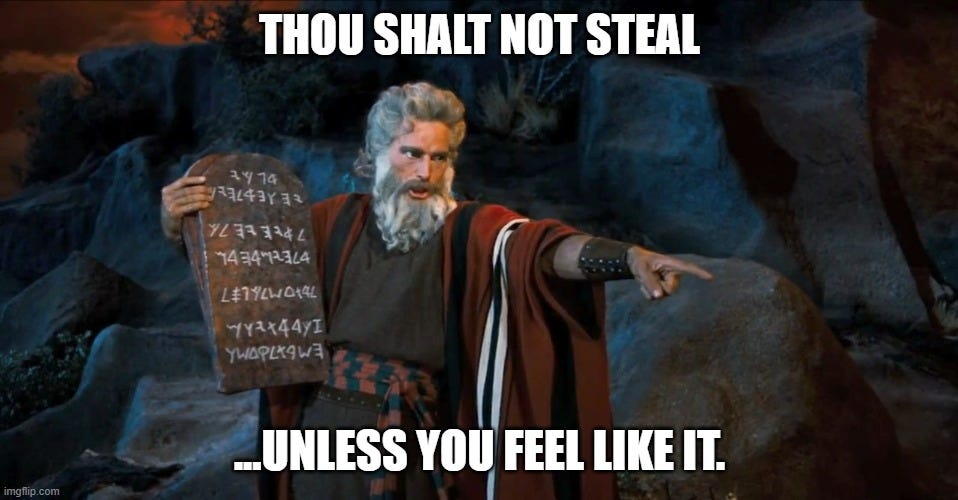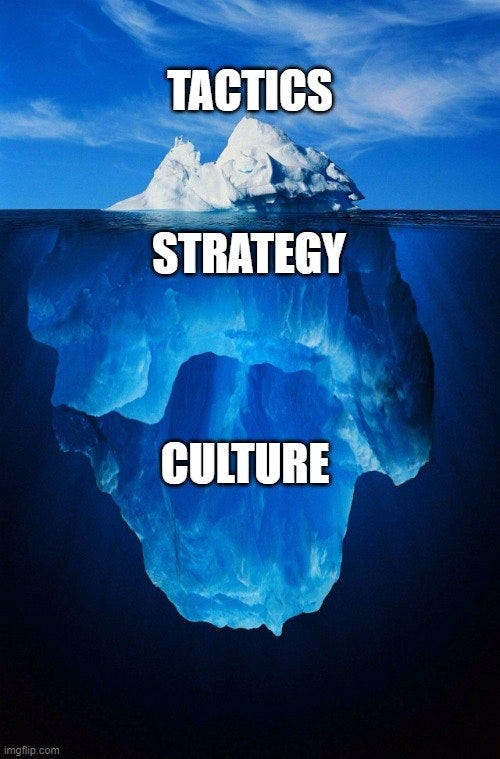Sunday Reads #162: What values does your company fight for, at all costs?
Moving beyond the fluff of a "culture code".
Hey there!
Hope you had a great week!
This week, let’s talk about company culture.
To a certain type of person (like me), “company culture” sounds amorphous, vague, and “soft”. Motherhood and apple pie stuff.
Until we start to think about it.
1. Beyond culture codes and mission statements. What really is “company culture”?
I read a great thread from John Cutler a few weeks ago. It has some fascinating lessons on organization design.
I keep returning to one of the insights:
What is a company's culture?
Cutler has the best encapsulation of what "company culture" means.
Now, some of these are straightforward. But a few don't come up that often:
What you fight for at all costs.
The worst behavior you accept, and the best behavior you reject.
The exceptions you make and the things that never budge.
These are all different flavors of the same sentiment:
What do you tolerate, and what do you absolutely not?
Where you draw that line - that's your culture.
When in consulting, I once worked with a company that proudly proclaimed, "No assholes here".
But no one in the company believed it. Because the top salesman happened to be a grade-A asshole. And he not only didn't get reprimanded, he even got promoted!
So, while the CEO was strutting around declaring, "We have no assholes", what everyone in the company heard was "... well, except for our star performers".
And that is the company's culture, for better or worse.
"Meet your targets. And if you don't meet your targets… then don't be an asshole".
But that's not the culture you set out to build, right?
When you think of the culture you want to create, it's definitive.
Like the Ten Commandments, your company culture code doesn't suffix "if we feel like it" to the end of every sentence.
Your company's culture code is not "We treat each other with respect. Well, most of the time".
But just stating what your culture is, isn't enough. That's not how culture gets built.
Writing something in font size 44 in a polished powerpoint deck does not create a culture. Even if you call it "culture code" to make it sound important.
No. Culture is created by the worst behavior you accept, as Cutler says.
Be mindful of that.
Kevin Aluwi of Gojek says something similar, in his conversation with Mario Gabriele:
You’ll find many incentives to deviate from your principles as you build your business. Maybe you’re lagging behind your revenue projections and feeling pressure from investors in one quarter. You know that you can make up the difference if you make an add-on opt-out by default (think about how some airlines automatically add premium travel insurance). Do you do it, even if it runs counter to your principle of customer obsession?
Violating your company’s values comes at a high cost. While you might get away with a couple of transgressions, over time, you create a different culture than the one you intended to. If you’re not careful, you’ll end up with an exception-based environment, where decisions are made based on what’s convenient (or who’s in charge) rather than on stated principles. A side effect is that you create a more top-down culture because employees no longer understand how to make decisions themselves. Instead, they defer to those in power.
You're creating the company culture everyday by your actions (and inaction).
Company culture isn't natural. You need to build it.
A related point - company culture is anything but natural. If it were obvious, then you wouldn't need to state it as a "culture code".
You need to reinforce your company's culture at every opportunity. That's how it becomes muscle memory.
Let me give you an example.
Strong opinions weakly held.
This is a common refrain among CEOs and leaders.
And once you say it, you can now express half-baked opinions with incredible conviction. After all, you did say that it's weakly held. If someone disagrees, they are free to speak up 🤷♂️.
Fair enough. But what did you do the last time a team member spoke up?
An obvious failure mode is if you got aggressive and made an isolated demand for rigor. "What's your basis for saying that? Did you do a survey?". It’s clear in this case that you’re holding your beliefs pretty strongly. Fail.
But a less obvious failure mode is if you listened and then incorporated their input without much ado.
Why is this second approach a failure mode?
It's because you may have role-modeled your belief, but you lost an opportunity to reinforce it.
Correcting one’s superiors is not natural at the best of times. It's even harder when the CEO is talking with strident confidence.
If someone musters the courage to still speak up despite these odds, you can't merely listen to her. No, you need to pause and commend that action.
You need to normalize that behavior.
The more unnatural a part of your culture is, the more you need to celebrate when it happens.
I know it sounds Pavlovian, but that's how you build a culture. By deciding what to say, and saying it often.
I read once about a company (I think it was Okta, from Frederic Kerrest's book) where they did something like this.
Every time any employee would disagree publicly with the founders in a town hall, they would pause and commend the employee.
What you feel as the CEO: Oh my god this is so awkward.
What the employees see: The CEO is willing to be awkward in support of this behavior. It must be really important to them.
Don't expect changing a company's culture to be easy.
As Cutler says, "Company culture is what you say and how often you say it".
You might tire of saying something for the 100th time. But your employees might just be beginning to suspect you’re serious.
Before we continue, a quick note:
Did a friend forward you this email?
Hi, I’m Jitha. Every Sunday I share ONE key learning from my work in business development and with startups; and ONE (or more) golden nuggets. Subscribe (if you haven’t) and join nearly 1,400 others who read my newsletter every week (its free!) 👇
2. Golden Nugget of the week.
Visa tweeted an inspiring clip from Steven Pressfield a few months ago.
"People always tell you that life is short. But actually, life is long."
Most of us aren't playing long enough games.
I started a company at age 29, ran it for a few years. Couldn't scale it beyond 250K users (story for another day), so I shuttered it. I joined another company.
And at 35, I said to myself, "OK, I won’t do this forever. I'm going to retire at 45, and sip mai tais on the beach."
But life is long. It's such a pity if your finish line is so close! What do you do after that? (Narrator: "He got dementia".)
Matt Damon's comment at 1:45 in this clip haunts me.
Even if you did achieve all you wanted - even if you did achieve greatness early - "if there's a hole in you, that won't fill you up".
Play long games.
If your finish line is close... run a longer race.
Mark Cuban is an inspiring example. Billionaire investor and long-time shark on Shark Tank. Has everything he needs and more.
And he's still learning Python through online tutorials, just so he can understand Machine Learning.

3. Books of the Month - Aug 2022.
One of my long-time readers told me he misses the book recommendations I used to give a few years ago.
Starting it again as a monthly experiment (let me know if it's useful!)
Here are the books I read over the last month:
A Gentleman in Moscow (Fiction, 10/10)
A lovely, sad, yet uplifting book. The first time in the longest that I was looking forward to finishing a book, just so I can start it again.
Four Thousand Weeks (Non-fiction, 9/10)
A standard human life is just four thousand weeks. How can you keep calm and carry on, when your mortality is staring you in the face? Lovely book.
PS. Some of my own reflections on the topic of death and mortality here.
The Founders (Non-fiction, 8/10)
Origin story of PayPal and the PayPal Mafia. Has some fascinating stories from the early days. Will share more notes soon, but meanwhile, do check it out.
Consider Phlebas, Culture Series Book #1 (Fiction, 7/10)
First book of the Culture series. It's the only iconic sci-fi series that I haven’t read yet. This first book is so-so, but book #2 (The Player of Games) is supposed to be brilliant. Reading that next.
4. Funniest thing I read all week.
(make sure to click and read all the snapshots 🤣).
That’s it for this week. Hope you enjoyed it.
As always, stay safe, healthy and sane, wherever you are.
I’ll see you next week.
Jitha










